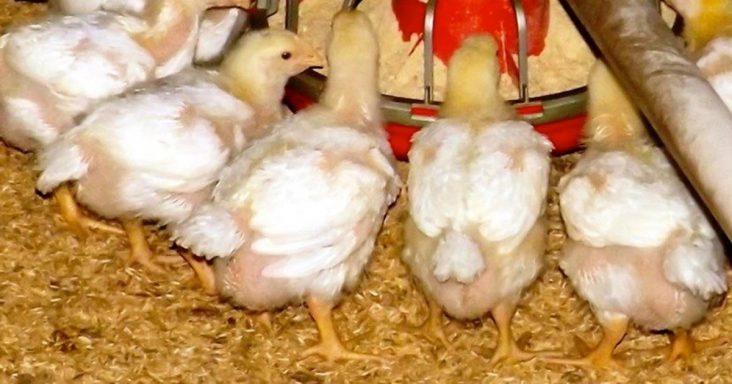Arkansas, Tyson chicken growers not substantially impacted by COVID-19
by May 6, 2020 3:36 pm 2,518 views

Arkansas is a major poultry producing state, second only to Georgia. While grocery stores are running low on chicken, Tyson Foods CEO Noel White told Talk Business & Politics the COVID-19 pandemic has not had a substantial impact on the company’s contract growers.
White said Tyson Foods is still placing birds with growers, but growth rates of the birds have been slowed to account for reduced capacity in plants from absenteeism. White said Tyson Foods has not been forced to euthanize or dispose of any chickens. He said while the company’s pork and beef segment have been hit hard with disruptions the situation has been less severe for Tyson Foods’ poultry plants. He said the disruption has been minimal in Arkansas, and “the rest of our poultry plants outside this specific region have seen some impact, but not significant.”
White made those comments during a call with media following the second-quarter earnings call on Monday (May 4).
One Tyson Foods chicken facility was shuttered from the COVID-19 outbreak in Kentucky from April 30 to May 3. Another poultry facility in Camila, Ga., was also impacted by several cases of COVID-19 infections, resulting in four deaths, according to local health officials.
White said Tyson Foods and the meat processing industry are complying with an executive order to remain open, and taking worker safety seriously. He said the company is sparing no expense to ensure workers have the protective gear required and plants are running at various levels of capacity depending on the level of impact.
This week U.S. Secretary of Agriculture Sonny Perdue asked governors across the nation and leadership of the meatpacking industry to establish the government’s clear expectations for plants to remain open while following the protocol from federal and state health officials to maintain worker safety.
“USDA expects state and local officials to work with these critical meat processing facilities to maintain operational status while protecting the health of their employees,” Secretary Perdue said. “Meat processing facilities are critical infrastructure and are essential to the national security of our nation. Keeping these facilities operational is critical to the food supply chain and we expect our partners across the country to work with us on this issue.”
Talk Business & Politics asked White to comment on the number of cases among Tyson Foods’ employees and verify or confirm the related deaths. White said while some state health departments were making those numbers public, Tyson Foods would not do so. He did say the company is putting the health and safety of its workers at the top of priorities. He was asked about absenteeism in plants relating to schools being out for the past two months. White said Tyson’s policy allows employees to stay home if they have children who require care.
FARMER INPUT
Tami and Casey Wilson operate a grower farm for Tyson Foods near Huntsville. The enterprise has been a major source of the family’s income for the past 20 years. Casey told Talk Business & Politics his farm has seen no real impact from COVID-19. He said the last pickup of birds occurred on time about two weeks ago. He received a new flock on schedule and they are slated for pickup in about five weeks.
Wilson could not comment on the slower growth of the birds because it’s a function of the feed rations provided by Tyson Foods. Wilson grows larger birds which typically go to foodservice.
While the restaurant sector has been hit hard overall, chicken appears to be in good supply at foodservice, but the retail segment continues to see short supply amid consumer stockpiling.
George’s Inc of Springdale also operates four chicken processing plants in Arkansas in addition to plants in Missouri, Tennessee and Virginia. The plants predominantly service restaurants. Like Tyson Foods, George’s has remained open, despite three cases of COVID-19 in different locations. George’s declined to identify the plants with positive cases but did release the following statement.
“At each of the affected plants, we immediately implemented our COVID-19 response plan actions, making sure that all health, safety, and sanitation measures were implemented, including deep cleaning procedures and notification of any coworkers who had possible close contact with these individuals. Our approach, and the practices we have adopted, follow the guidance issued by the CDC and utilize the hierarchy of controls.”
Stacy Cheevers grows broilers for George’s. His farm, located between Fayetteville and Elkins, is out of birds. Cheevers said his 250,000 birds were picked up on schedule about 10 days ago. He said the lay-off time in between flocks is typically 21 to 28 days and he’s still in that window. Cheevers expects to get birds on schedule in a few weeks. He also grows larger birds that go to quick-serve restaurants which have remained open throughout the COVID-19 outbreak, although for take-out only.
Cheevers, like many poultry growers in Arkansas, also runs a cow-calf operation which has been hit hard by the COVID-19 outbreak. Cheevers’ farm has a herd of about 150 head.
“We sold off our Spring calves in early March as the market took a big hit. We saw significantly less income from that sale. We hope the market returns to some sort of normalcy before we sell in again in late fall,” Cheevers said.
